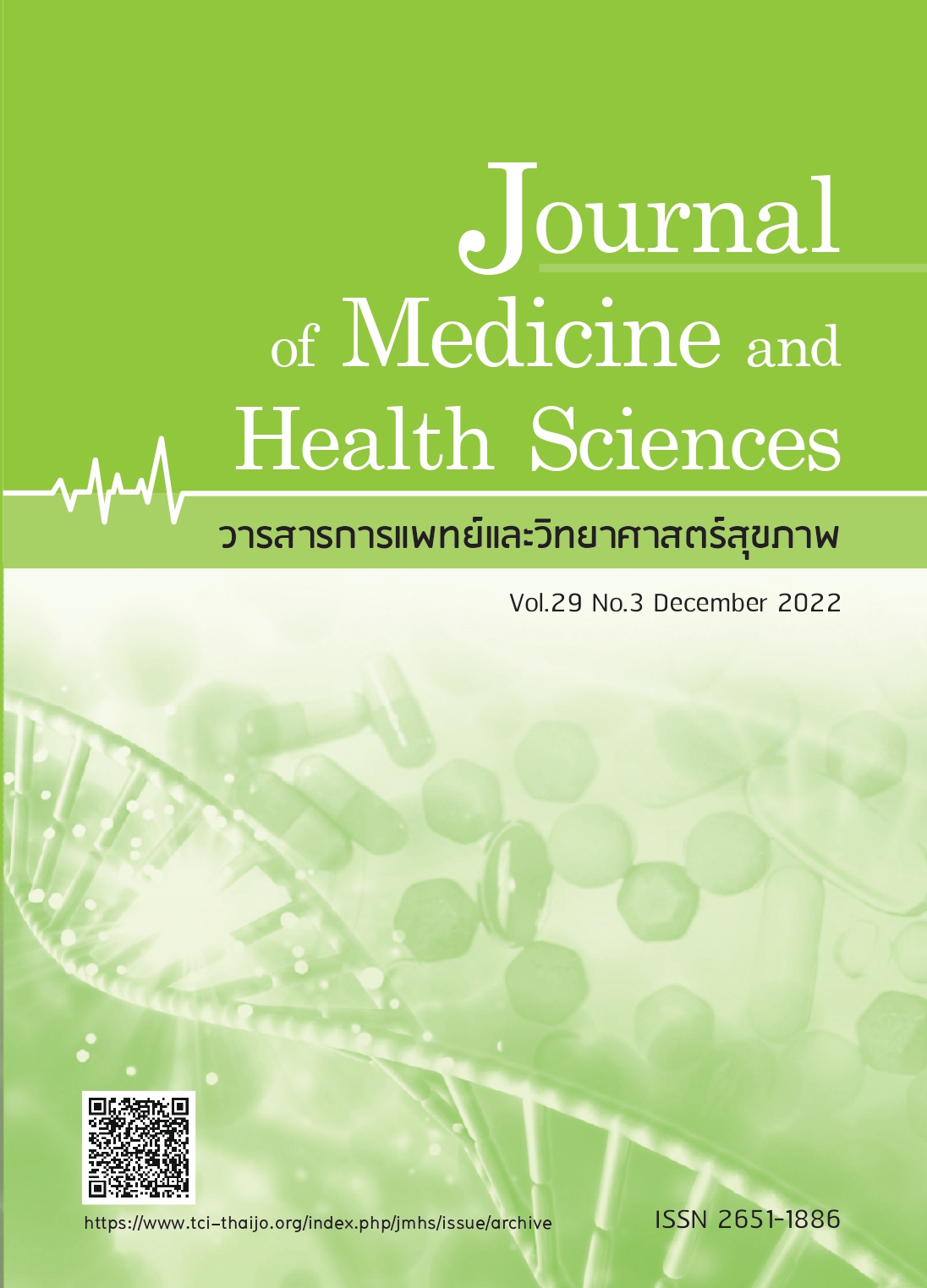Knowledge, perceptions, and attitudes of patients regarding advance directives at the End of Life Care at Maha Chakri Sirindhorn Medical Center
Keywords:
Advanced health care directives, Living will, Palliative careAbstract
Abstract
Despite the 2007 National Health Act on the right of terminally ill patients to decide not to receive life-saving treatment, but the general public, including medical personnel, still have incorrect perceptions. Therefore, the study of knowledge, understanding, and attitudes towards forethought at the end of life will provide information, and be able to make plans to decide when the end of life is coming. The purpose of this descriptive study was to determine their level of knowledge, perceptions, and attitudes regarding advanced health care directives or living wills for end-of-life care among patients and their relatives at HRH Princess Maha Chakri Sirindhorn Medical Center (MSMC). The survey and descriptive study was conducted from May to July 2021 by the random sampling of patients and their relatives who visited the outpatient internal medicine department at HRH Princess Maha Chakri Sirindhorn Medical Center at Srinakharinwirot University. The questionnaires were categorized to baseline characteristics, knowledge, and attitudes to advanced directions at end of life care. The data were analyzed as descriptive analyses and reported in terms of percentage, mean, and media. The study sample consisted of 464 patients and their relatives at the outpatient internal medicine department of MSMC and chosen by random sampling. The majority of the participants were female (64.01%) and an average age of 48. Most of the patients were Buddhists (87.26%), 66.59% of the samples had knowledge and understood the definition of the end of life and 76.08% understood palliative care. However, only 45.69% knew about revising advanced health care directives and only 30.60% understood the format. As for the attitudes, most of the samples thought that they did not know much about living wills mean total score is 2.59 ± 1.12, and interested to do the living will with a mean total score of 3.01± 1.17. Most of them were likely to encourage their friends or relatives with incurable diseases to accept palliative care instead of full medication care, by a mean of 3.35 ± 1.21. Furthermore, most of them had high expectations of information and counselling about living wills from health professionals with a mean total score of 3.89 ± 1.0. Based on the results, the research suggests that there should be promotions and campaigns to increase knowledge and perception among the patients and relatives about decision-making and choosing a method in terms of advanced health care directives. In addition, further research should study more factors, such as education, occupation, religion, or beliefs that may affect decisions about advanced health care directives.
References
National Health Commission Office [Internet]. Nontaburi: Sahaphattanaphaisarn Limited Partnership; 2007. 5th National Health Act Thailand (2007); [cited 2021 Sep 16]. Available from: https://www.nationalhealth.or.th/sites/default/files/upload_files/app650803_6654.pdf
Pechkong D. Living Will [Internet]. [Bangkok]: The Secretariat of The House of Representatives 2021 [cited 2021 Sep 19]. Available: https://www.parliament.go.th/ewtadmin/ewt/elaw_parcy/ewt_dl_link.php?nid=1786
Suwannil L. Preferences of patients and their surrogates for advance directives at the end of life [Master of Nursing Science Program in Adult Nursing]. Songkhla: Songkla University; 2012.
Bunchaloemwiphat S. According to Section 12 of the National Health Act Thailand (2007); Right for Natural Death [Internet]. [Nontaburi]: National Health Commission Office; [cited 2021 Sep 16]. Available from: https://infocenter.nationalhealth.or.th/node/27592
Bussa P, Pornpiboon P, Sittisombut S. Knowledge and Attitude Regarding Advance Directives for End of Life Care Among Physicians and Nurses. Nursing J 2019;46(3):38-48.
Intajak T, Prutipinyo C, Sirichotiratana N, et al. Senior Citizens’ Opinion on Declaration of Intention to Refuse Public Health Service at Patients’ Terminal Stage of Life in Lampang Province. JPHLaw 2018;4(2):164-77.
Kangwansura R, Tienthavorn T, Srisuwan P, et al. Factors affecting older adults’ decision-making on having a living will. PCFM 2022;5(1):33-44.
Srisuwan P. Attitudes Towards Living wills and Factors affecting Living wills writing decisions of
Borabue hospital’ Patients. AJMPPHO 2016-207;1(1):39-50
Downloads
Published
How to Cite
Issue
Section
License

This work is licensed under a Creative Commons Attribution-NonCommercial-NoDerivatives 4.0 International License.



